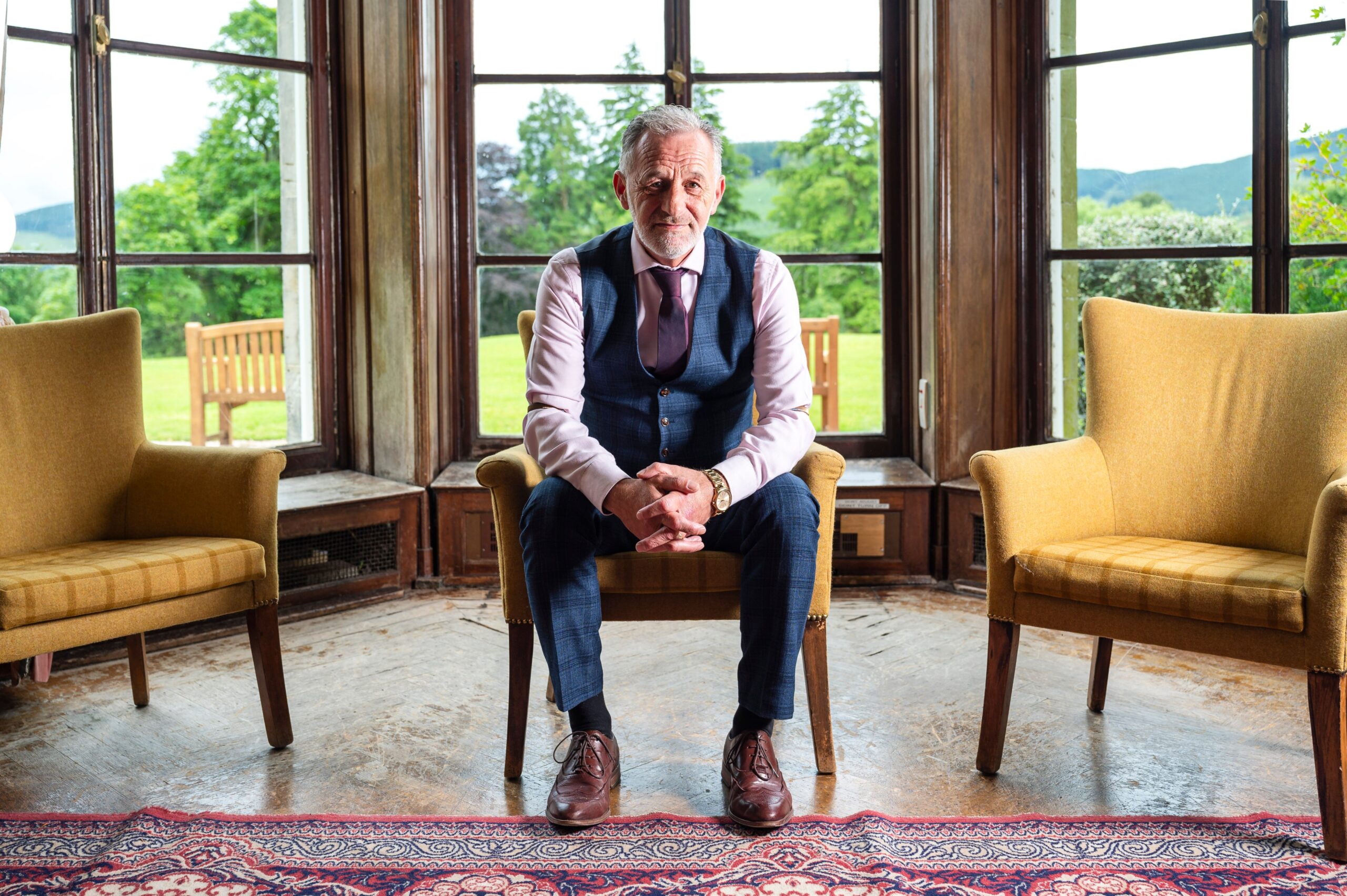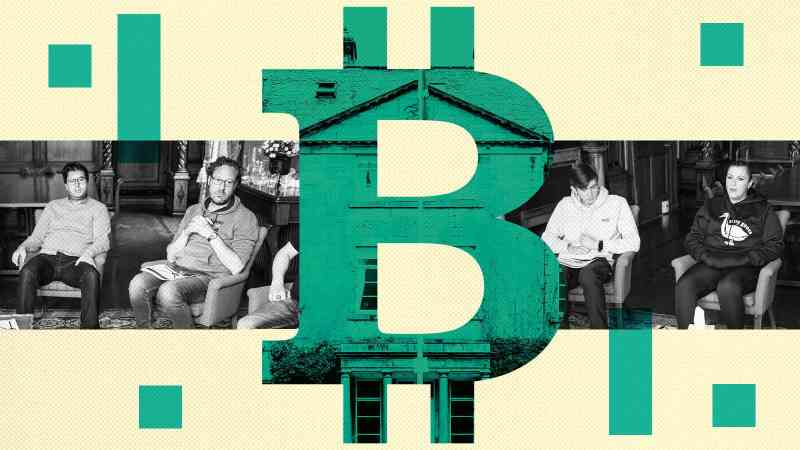Inside the £4,000-a-week clinic treating crypto addiction
It is an overcast Thursday afternoon and in a wood–panelled room of a remote mansion in the Scottish countryside, 11 people sit in comfortable armchairs arranged in a circle. Through the large bay window you can see dramatic forests and hills beyond a neatly trimmed lawn.
I’m at Castle Craig, a rehab clinic about an hour’s drive from Edinburgh, where gambling and cryptocurrency addicts come to seek help and share their stories in a group led by Tony Marini, a therapist and former gambling addict.
Karim*, who has spent a month at Castle Craig, became addicted to trading cryptocurrencies. He said he had lost about £1.5 million making speculative bets on the price of cryptocurrencies — last year his marriage ended after he took money from his wife’s bank account to fuel his addiction.
• Cryptocurrencies are digital encrypted currencies that can be used to make payments. There are thousands of them. • They are managed using a digital record known as a blockchain, which acts as a public ledger confirming ownership. • Bitcoin was the world’s first cryptocurrency, launched in 2009, and remains the largest.
“I felt I had money problems and the way to solve it was with crypto. I never thought it was an addiction,” said Karim, 35, who has travelled from Istanbul for treatment. “If I had money I would spend it on trading, and when I didn’t have the means to do it I borrowed from other people. It led me to do a lot of bad things.”

Patients who go to Castle Craig for help with an addiction to crypto trading are treated in the same way as gambling addicts and take part in a 12-step programme, a form of therapy where patients are given clear stages to work through towards recovery. The residential treatment costs from about £3,800 a week. About 37 per cent of patients pay for treatment themselves, about 42 per cent are funded by private health insurance, and 21 per cent have their treatment funded by the NHS.
About 5.36 million people in the UK own or have bought crypto assets, government figures show. One in ten people who invested in crypto said it had become a “problem” for them, according to a YouGov survey of more than 5,000 adults in February commissioned by the charity GamCare, which offers support to gambling addicts and runs the National Gambling Helpline. Of those who had invested in crypto, 13 per cent said they wanted to stop.
In 2022 about 76 per cent of people who owned crypto were under the age of 45, and 69 per cent were men, according to HM Revenue & Customs. Of those who owned crypto, 53 per cent had a holding worth less than £1,000, but 7 per cent owned assets worth more than £5,000.
Investors in the UK bought or were sent a total of $252 billion of crypto assets in the year to June 2023, according to the research firm Chainalysis, the third highest of the countries included in its data. The US ranked highest with more than £1 trillion of crypto assets.
• My son got obsessed with crypto trading. Here’s what happened
An investment or a gamble?
The government has promised to turn the UK into a “global hub” for crypto firms. It has announced plans to integrate stablecoins — a type of cryptocurrency pegged to the value of government-issued currencies such as sterling — into the country’s payment network.
In January financial regulators in the US approved the sale of exchange-traded funds (ETF) that track the price of bitcoin. An ETF is a type of fund that is traded on a stock exchange in its own right and aims to replicate the performance of an index or asset, such as the FTSE 100 or gold. About$15.5 billion has poured into bitcoin ETFs since January, according to the investment firm CoinShares.
But there is a dark side, which is on stark display at Castle Craig. This is the second time I have visited the centre, which started treating patients addicted to crypto in 2016. When I came here two years ago the clinic had treated about 120 patients from across the world. That figure is now more than 300.
Last month Amanda Pritchard, the chief executive of the NHS, said increasing numbers of crypto addicts were attending gambling clinics and warned that the NHS was being left to “pick up the pieces”. Last year MPs on the Treasury select committee said that crypto trading “more closely resembles gambling than it does a financial service”. It said cryptocurrency should be regulated in the same way as gambling.
Lisa Marie-Patton from GamCare said those asking for help with an addiction to crypto trading were typically men aged 24 to 35. “We see it more in younger men who think crypto is a way to solve their financial problems. It’s getting really serious — I’ve seen parents have to bail their children out and people are losing their homes. You can gamble on crypto prices 24 hours a day, seven days a week, from your mobile phone.”
A key reason that crypto is thought to be addictive is its price volatility. “Because it’s going up and down so quickly, people feel like they need to look at it constantly. Gamblers love that high and low. The mind becomes obsessed and enough is never enough,” Marini said.
• Germany sells off ‘Saxon treasure’ of confiscated bitcoin
‘I get a kick from losing money’
The price of bitcoin, the world’s most popular cryptocurrency, has gone up 690 per cent since the start of 2020 and traded at about $57,900 (£44,570) on Friday. It was worth about $69,000 in November 2021 but fell to about $16,000 a year later after the high-profile collapse of the crypto exchange FTX. It hit a record price of more than $73,000 in March this year.
There are thousands of different cryptocurrencies and the price swings of the smaller ones can be even more dramatic.
The Covid-19 pandemic is believed to have fuelled the boom, when many people found themselves bored at home with spare cash to play with. In May 2022 some 29 per cent of people between the ages of 18 and 34 had some kind of investment, according to the Financial Conduct Authority (FCA) the City watchdog, up from 19 per cent in 2020. About 46 per cent of those people held cryptocurrency.
Doctors at Castle Craig say that about 90 per cent of the patients they treat for crypto addiction are men; most are middle-class and under the age of 40. “But we’ve had labourers come in for treatment and we’ve had billionaires,” Marini said.
Chris* started gambling after he began taking cocaine, he tells the group. “I never really chased the jackpot, I get a bigger kick when I lose money.” It is a recurring theme across the 40-minute session. “I got a thrill from winning, but I also revelled in losing,” says another member of the circle.

Karim, who works for a healthcare company, started betting on the outcome of sports fixtures and investing money that he made in the stock market while he was at university. In 2017 he put about $3,000 into small cryptocurrencies such as Dogecoin and Solana. Four years later his stake was worth about $150,000. “In the beginning I was quite good at it and kept winning,” Karim said.
As his confidence grew he began making leveraged trades — a risky strategy where investors typically borrow money from an exchange or trading platform to make an investment. Leveraged trades magnify your returns if they go well, but increase your losses if they do not. Traders normally have to pay a deposit which can be lost if their trade goes awry, and they can end up owing large amounts to the lender.
Over three years Karim has lost about £1.16 million that he borrowed from his friends and family, some of whom asked him to invest on their behalf. He also thinks he also lost about £386,000 of his own income and savings.
“It was a big losing streak,” he said. “I couldn’t tell anyone. I kept trying to make the money back. I could open multiple investment positions on my mobile phone. I wasn’t sleeping during the night because I was checking prices. I put my wife in a miserable position.”
Karim felt driven to get treatment because he wants to have a good relationship with his two-year-old daughter. He said stopping all types of investment is an important part of his recovery. “I have run out of money and need to earn it back. I’m trying to maintain a healthy routine and meditating and trying to do regular exercise,” he said.
Despite the risks, many investors still consider cryptocurrency a valuable part of their investment portfolio. The bitcoin investor and podcaster Peter McCormack, who bought the football club Bedford FC in 2021, said: “I have bitcoin in my portfolio to protect my money against inflation. The government is never going to stop increasing the supply of money. Bitcoin has a fixed supply and there is a similar incentive to holding it as there is for gold.”
Benjamin Dean from the investment firm WisdomTree, which runs a bitcoin ETF, said: “The first reason you might include crypto in your portfolio is diversification. Crypto has low correlation against other asset classes. There are also only a few asset classes historically where returns from your investment can increase by multiples of the original amount.”
However, for the most part, crypto is not regulated in the UK and the FCA has repeatedly said those who invest should be prepared to lose all their money.
At Castle Craig, the session draws to a close with a prayer. Standing in a circle, the group chant: “God grant me the serenity to accept the things I cannot change, the courage to change the things that I can and the wisdom to know the difference.” They file out of the room chatting happily.
About 63 per cent of patients who were treated for an addiction at Castle Craig last year have not yet relapsed.If you are looking for support for yourself, a friend or a family member with a gambling problem, GamCare can help.
Do’s and don’ts
DO think carefully before you buy crypto. If you are investing just because the price has gone up, or because a friend or someone on social media claims to have made a packet, then you need to find a better reason to part with your money.
DO research the platform you are using to buy crypto. Consider charges and safety. Regulation of the sector is not as stringent as for other investments and the FTX collapse shows how you can lose your money.
DO consider investing in shares instead. They don’t have the highs and lows of crypto, but over time will usually be a better way to build your wealth, and definitely carry less risk.
DON’T invest more than you can afford to lose. A total wipeout is plausible if crypto ultimately fails to become widely accepted.
DON’T be tempted by newly created crypto coins or those that do not have much money invested in them. At best they have a low chance of long-term survival, and at worst are just scams.
DON’T think you won’t have to pay tax on gains. The authorities are getting more interested in cracking down on tax avoidance in the crypto sphere.
*Names have been changed




Post Comment